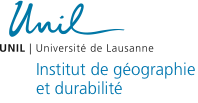Institute of Geography and Sustainability of the University of Lausanne
Research projects
Risk, territory and formal/informal practices in the environmental, social, cultural and political context in Guatemala
In developing countries, mountain populations and territories are subject to multiple risks and vulnerabilities. Many different types of actors manage risk at various spatial scales and levels (i.e. engineers, geologists, administrators, land use planners, merchants and local indigenous and non-indigenous people). Due to limited resources and possibilities not all risks can be mitigated. As a result, each of these competing ‘risk managers' has to choose which types of risks need to be addressed first. My PhD research is a case study of this prioritization in San Cristobal Altaverapaz, Guatemala where a large landslide named “Los Chorros” currently affects several communities and one of the country's main west-east access roads. At the crossroads of political science, geography and disaster risk management, my research addresses the social conflict resulting from the competition of the various stakeholder's priorities and solutions for risk reduction management. My work uses a method know as the analysis of practices, (Practical Science), policies and institutions in order to understand how the early inclusion of multiple stakeholders in determining risk priorities can lead to more sustainable risk management in a given territory. I introduce the multi-criteria analysis method to consider a large number of elements and criteria linked with the vulnerability assessment, in order to develop an appropriate and comprehensive measurement of risk reduction. This method consists of identifying the stakeholders or risk managers, their resources, interests and scopes of action. This identification process shows that we need to improve our knowledge about individual and collective perceptions of risk and environmental values in the indigenous and non-indigenous societies of Guatemala. One way to achieve this is to observe how this perception is reflected in their social practices. At last, I also explore the cultural, developmental and organizational characteristics of each group that promote or inhibit prevention and risk reduction measures.
Publications
| Fernandez, M. and Ruegg, J. (2012). Territory management an appropriate approach for taking into account dynamic risks. In Geophysical, R.A., Vol, 1.E.-P.2., Egu, G.A.2. et ©, A.2., Geophysical Research Abstracts. : EGU General Assembly 2012. | Info | |
| Fernandez, M. and Ruegg, J. (2011). Un défi des gestionnaires de territoire: comment composer avec les différentes définitions des risques ? In Comité, D.L.J.2., Journée de Rencontre sur les dangers naturels 2011. : IGAR-UNIL. | Info |
